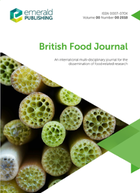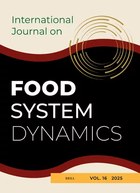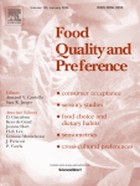Pubblicazioni condotte dal gruppo di ricerca di FARE-Lab

Drivers of liking and value perception for a new apple cultivar in Italy
Sergio Rivaroli, Roberta Spadoni, Stefano Tartarini, Roberto Gregori, Bettina Riedel, Paola Draicchio, Luca Folini, Themistoklis Altintzoglou, Maurizio Canavari
Combining sensory evaluations and hypothetical valuation mechanisms, this study aims to investigate the impact of consumers' product sensory attributes on willingness to pay (WTP) and overall liking for a new apple cultivar. A sample of non-expert participants (n = 122) evaluated the overall liking and just-about-right (JAR) attributes. A variable transformation approach was applied to make linear and interval regression models between the JAR attributes, overall liking scores and participants' WTP. The study reveals the high consumer appreciation for the new apple in both hedonic and economic terms. After controlling the anchoring effect's bias, the predicted mean WTP for the new apple cultivar was €3.26 per kilogramme. Crunchiness and flavour significantly affect both participants' overall liking and WTP. The main limitation is the non-probabilistic sampling procedure, which does not allow for the generalisation of the results. Penalty analysis for JAR attributes in monetary and hedonic terms is beneficial for optimising the product and evaluating its potential in the marketplace. The findings provide helpful directions for product optimisation in future breeding programmes to ensure the long-term sustainability of the new apple cultivars in the marketplace. This study provides evidence of the beneficial synergy of mixing sensory-oriented research with the behavioural economics field of study.

Sensory Perception and Willingness to Pay for a Local Ancient Pear Variety: Evidence from In-Store Experiments in Italy
Sergio Rivaroli, Massimiliano Calvia, Roberta Spadoni, Stefano Tartarini, Roberto Gregori, Cristina Calvo-Porral, Maurizio Canavari
Product optimisation is one of the most crucial phases in the new product development or launch process. This work proposes applying penalty analysis to investigate the impact of not just-about-right (JAR) sensorial aspects on willingness to pay (WTP) and an overall liking for a local Italian ancient pear variety and to verify the mediating role of pleasantness in the relationship between not-JAR sensory attributes and consumers’ WTP using structural equation model (SEM). One hundred and twelve non-expert participants recruited during an in-store experiment evaluated overall liking and JAR attributes and were involved in an in-field experimental auction based on the non-hypothetical Becker–DeGroot–Marshak (BDM) mechanism. The participants’ average WTP for the sample was EUR 3.18 per kilogramme. Only juiciness and sourness significantly impact consumers’ overall liking but not on consumers’ WTP. Moreover, pleasantness did not mediate the relationship between non-balanced sensorial aspects and WTP. In conclusion, the penalty analysis for attributes not being JAR in monetary and hedonic terms is a beneficial research approach for a deep-inside evaluation of the potentiality of the product in the marketplace, providing helpful directions for product optimisation. Results show market potential for the local ancient pear variety ‘Angelica’.

What drives consumers’ intention towards fairness-oriented products purchasing? An emotion-extended model of theory of planned behaviour
Antonella Samoggia, Giulia Rossi, Andrea Fantini, Evangelia Mouchtaropoulou, Notis Argiriou
Fairness-oriented products have attracted increased interest in the last few years, particularly within the context of agrifood systems. However, in scholarly literature, limited studies are available where researchers discuss what drives consumers' choices towards fair food. This study investigates consumers’ purchasing intentions towards fairness-oriented food products by applying an emotion-extended model of the Theory of Planned Behaviour (TPB). Building upon TPB, the research incorporates emotions and price perception as additional variables to understand consumers' attitudes, subjective norms, and perceived behavioral control towards fairness-oriented food products. Data collection includes a survey carried out with a convenience sample of 294 Italian consumers. Data elaboration includes a Structural Equation Modeling to explore the complex relationships between the extended TPB constructs and their influence on consumer purchasing intentions. The findings reveal the significant impacts of emotions on attitudes and subjective norms, therefore highlighting its indirect effect on consumers' intentions. Attitude and subjective norms emerged as the main direct drivers of intention to purchase fairness-oriented food products, while perceived behavioral control and price perception showed no significant impact. Furthermore, the study applied an ANOVA analysis to identify sociodemographic differences, indicating varied perceptions and beliefs among different age groups, educational levels, and those valuing fairtrade labels. The value of current research aims at understanding how consumers perceive fairness throughout the agrifood chain. In addition, it provides valuable managerial insights, highlighting the role of emotions in shaping consumer intentions towards ethical behavior.

Retail practices for plant-based meat alternatives in Italy
Antonella Samoggia, Giulia Rossi, Giuseppe Macaione and Aurora Guidotto
This study explores in-store retail sales practices for alternative protein products in Italy, with a focus on plant-based meat alternatives (PBMAs) compared to conventional meat products. It also investigates PBMA across different brand and business protein orientations to uncover disparities in retail practices, with attention to conventional and discount retailing.
Data are collected in Bologna, a mid-size metropolitan area in Italy, during autumn 2023. The methodology involved conducting in-person store audits across ten supermarkets and hypermarkets. The data collected encompasses variables such as protein type, product format, price, promotions, product shelf placement and protein orientation. Data elaboration includes Analysis of variance (ANOVA) testing and multivariate linear regression.
Results support that retail management practices price PBMA higher, offer fewer promotions and place them in the “ready-to-eat” department versus the meat department, if compared to conventional meat products. This suggests that Italian retailers do not consider PBMA as a direct alternative to the meat, but rather as a distinct food product category with its own retail management practices. The study also reveals that PBMA brand and business protein-orientation management practices influence pricing and sales. Retailers’ managerial approach shapes PBMA sales and consumer purchasing behavior.
The study is pioneering research on retailers and PBMA, a rapidly expanding food category. It focuses on Italy, a country where interest in alternative protein products remains limited but shows significant potential for growth. Finally, it provides a detailed analysis of in-store retail food management practices balancing PBMA with conventional meat products.

A Systematic Literature Review of Cultured Meat Through the Conceptual Frameworks of the Entrepreneurial Ecosystem and Global Value Chain
Chiara Benussi, Antonella Samoggia
Cultured meat (CM) is currently experiencing a surge in popularity, primarily due to its promise to produce animal-based products with a lower environmental impact and a higher level of animal welfare. Although CM production remains limited and lacks premarket approval (except for Singapore and the USA), recent technological advancements have been notable. A greater number of stakeholders, including biotechnology companies, start-ups, private investors, NGOs and big agrifood companies, are entering the CM value chain. This paper aims to aggregate, synthesize, and analyze existing studies on the CM value chain to highlight the characteristics, methodologies, and topics they address. Our secondary purpose is to analyze elements emerging in terms of global value chain dynamics. To do so, this study applies a conceptual framework based on the interplay of the Entrepreneurial Ecosystem and global value chain frameworks. This systematic literature review identifies 43 studies and shows that the most addressed topics are regulations on premarket approval and labelling, technological progress, the use of patents, the availability and sources of funding, and actors’ roles in the CM market. The analysis and discussion of these findings highlight key aspects of the CM global value chain and present further areas of research to investigate the governance of the chain.
Fairness in coffee value chains: organizational solutions for the self-governance of small producers
Andrea Fantini, Antonella Samoggia, Leonardo Bonfigli, Xiomara F. Quiñones-Ruiz
Introduction: This research aims to identify key organizational mechanisms that enable small coffee producer associations to create equitable and sustainable alternatives to conventional supply chains, which are characterized by strong inequities and asymmetries. Through an in-depth case study of northern Colombia, this study reveals how collective organization and equitable decision-making processes can transform power dynamics, allowing small- scale producers to retain greater value and establish economic, social, and environmental sustainability.
Methods: Building on a comprehensive theoretical framework of fairness—encompassing distributive, procedural, interactional, and environmental dimensions—the research employs a mixed-methods approach combining quantitative data from 40 coffee producers regarding their perceptions of ffairness with qualitative insights from semi-structured interviews with producers and technicians cooperating within the case study.
Results: The central finding demonstrates that producer-led collective governance structures directly strengthen self-determination and enable small-scale farmers to challenge dominant supply chain inequities. Specifically, the study reveals that equitable decision-making processes are the critical mechanism through which coffee associations successfully retain value and achieve sustainability across multiple dimensions.
Discussion: This research makes an original contribution by empirically demonstrating how producer associations can serve as viable organizational models for transforming global agricultural value chains. By empirically demonstrating that grassroots collective action provides a robust alternative to conventional approaches to supply chain sustainability, the study offers concrete evidence of the potential for small-scale producers to effect meaningful change in the coffee industry.

Is precision viticulture worth the effort? An evaluation using the Price Sensitivity Meter and experimental auctions
Massimiliano Calvia, Sergio Rivaroli, Anna Uliano, Marcello Stanco, and Maurizio Canavari
This study examines consumers’ willingness to pay (WTP) for “precision viticulture” in the production of the Italian wine “Falanghina del Sannio” using van Westendorp’s Price Sensitivity Meter (PSM) and Becker-deGroot-Marschak (BDM) experimental auctions. Results show that the “precision viticulture” attribute contributes approximately 22.25% to the total value of a sustainable bottle, with revenues maximised at the price of 2 Euros. A 1% price increase reduces demand by 3.31%. Higher baseline wine values and female consumers show higher WTP. These insights can guide policymakers and wine producers in pricing and marketing sustainable wine, especially to environmentally-conscious and high-value consumers, particularly women.

What does (not) motivate Gen Z to pay for plant-based milk alternatives? A study on Italian consumers
Sergio Rivaroli, Cristina Calvo-Porral, Rachele Ferretti, Davide Giacalone, Ángel A. Carbonell-Barrachina, Jörg Lindenmeier
Purpose
This study, grounded in the Food Choice Questionnaire (FCQ), examined what factors drive Italian Generation Z (Gen Z) to pay for plant-based milk analogues (PBMA).
Design/methodology/approach
511 Italian Gen Z consumers participated in an online survey. The survey included items from the FCQ and Contingent Valuation (CV) to assess the impact of consumer attitudes and dietary habits on their willingness to pay (WTP) for PBMA. An interval regression analysis was employed.
Findings
The findings indicate that most food choice drivers examined do not motivate Italian Gen Z's WTP for PBMA. Only selling price, dietary habits, perceptions of naturalness, and personal mood significantly influence the participants' WTP.
Originality/Value
Current research sheds new light on Gen Z consumers' motivations for shaping their purchasing intentions towards PBMA, providing valuable insights for the agri-food industry and policymakers.

Enabling the sustainable protein transition: Alternative protein companies’ perspective on key factors influencing companies’ performance in Europe
Chiara Benussi, Antonella Samoggia
Alternative proteins (AP) products can contribute to a sustainability-oriented agri-food system, by creating significantly lower carbon emissions, and reduced land and water use compared to animal products. AP companies are key actors in shaping the transition toward sustainable agri-food systems. To further enhance the AP companies’ impact, it is essential to understand their performance in this competitive and fast-evolving market. This research explores the companies’ perspective on factors influencing the performance of European AP ingredients and food processing companies. The study adopts a theoretical approach based on sustainability transition to analyze factors at three levels of action: company, market and external environment. Based on semi-structured face-to-face in person or online interviews with 37 company representatives throughout Europe, the study identifies limiting and enabling factors shaping company performance. Findings reveal that product characteristics are among the most significant determinants of success. Companies prioritize developing products that are tasty, nutritionally balanced, and affordable to meet consumer expectations. Performance is further enhanced by highly skilled team; investment in R&D to improve products characteristics; partnerships with co-manufacturers; and increased retailer commercialization of AP products. Limiting factors include low consumer acceptance; financial and technological constraints to scalability; uncertainties regarding market growth; and regulation hurdles. The findings highlight key issues of the European AP market and offer valuable insights to support its continued growth and contribution to agri-food system sustainability.

What triggers Gen Z to choose plant-based milk analogues?
Sergio Rivaroli, Roberta Spadoni, Cristina Calvo-Porral, Jörg Lindenmeier
Purpose: This study, grounded in the food choice questionnaire (FCQ), examined the relationship between the attitudes and dietary habits of German Generation Z and their willingness to pay (WTP) for plant-based (PB) milk substitutes.
Design/methodology/approach: An online survey was distributed to 252 German Generation Z consumers. The survey included a FCQ and contingent valuation items, which were used to analyse the impact of consumer traits on WTP for PB milk alternatives using interval regression analysis.
Findings: The study’s outcomes upended the initial assumptions regarding what motivates Generation Z in Germany to pay more for PB milk substitutes. Vegans’ higher WTP than omnivores can be interpreted as a personal investment in affirming and preserving their “plant-based” identity in the eyes of others.
Originality/Value: The research provides fresh insights into the motivations of Generation Z consumers regarding their purchasing intentions for PB milk alternatives, offering valuable managerial guidance.